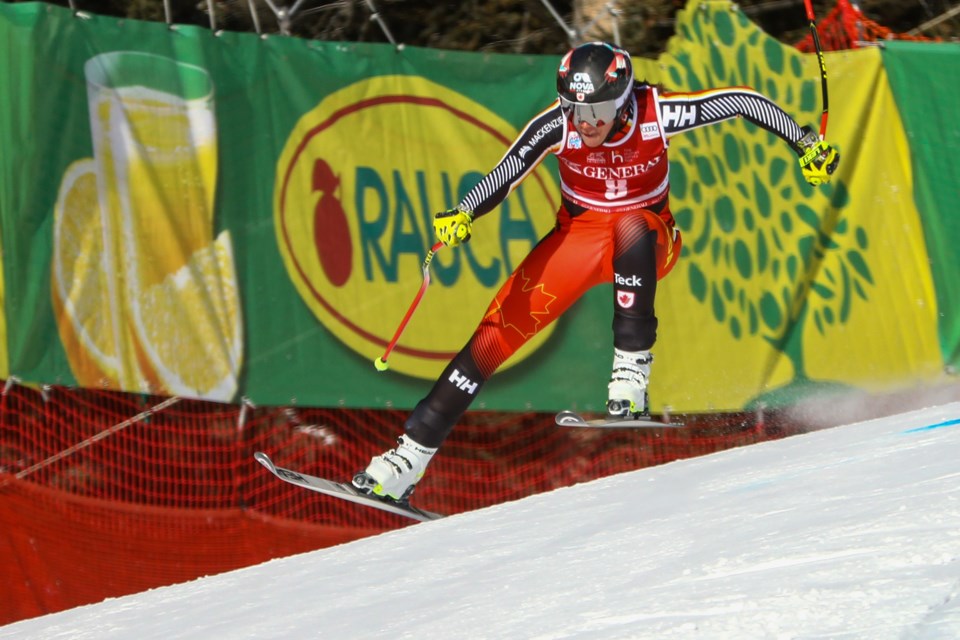LAKE LOUISE – This could be the last year of world cup ski races in Lake Louise for the foreseeable future.
Starting next season, the women’s speed world cup in Lake Louise will be replaced by newly announced women’s world cup technical races at Mont-Tremblant, Quebec, which has led many to believe the men’s speed world cup in Banff National Park is next to go.
“Everything we’re talking about it is about money,” said Peter Lange, publisher of Ski Racing Media and industry insider.
Last August, Ski Racing Media was one of the first media outlets to report that the world cups at Lake Louise would relocate after 2022; something that makes sense to Lange – at least on the women’s side.
Speed skiers (super-G, downhill) and technical skiers (slalom, giant slalom) don’t travel together on the world cup circuit.
The early December women’s world cup in Lake Louise is the only women’s speed event in North America. Whereas in late November, Killington Ski Resort in Vermont hosts a women’s tech event, which is less than 450 kilometres from Mont-Tremblant and perfectly aligns with the current FIS scheduling.
“To me, the most obvious answer to this situation was it just got too expensive to do,” said Lange.
“It’s much cheaper for all teams, including Canada and the United States, to send just tech women to Tremblant and Killington. That’s why it makes perfect sense to me … It fits from the FIS side, from the ACA [Alpine Canada Alpin] side, beautiful; it really helps out teams.”
In an interview with The Canadian Press, ACA CEO Therese Brisson backed up that there are high expenses to run the six world cup races (three men, three women) in a national park.
“In order to make Lake Louise work, we need the scale of six races, or we have in the past. It has probably the highest costs for snow-making in the world,” Brisson said to The Canadian Press’ Donna Spencer in the Oct. 18 article.
ACA took over operations of the world cups in Banff National Park earlier this year after it had been previously run by Winterstart Events Ltd.
Still undecided is what happens to the men’s speed event currently held at the famous Canadian lake every November. The event is locked in for Lake Louise for 2022, but could be moved elsewhere starting next season.
ACA's media spokesperson Mark Halliday didn't return emails or phone calls to the Outlook when asked to set up an interview on Oct. 18 with ACA about the future of alpine world cups in western Canada before the Oct. 26 press deadline.
In an Oct. 18 media release, ACA said it is “finalizing our long-term strategy” for the men’s world cup in the west. The Canadian alpine governing body said that “several resorts” are keen to host world cups, but only Lake Louise was named in those under consideration.
A late-November men’s speed event in western North America aligns with the FIS calendar and Beaver Creek, Colorado’s world cup in early December.
Following the cancellation of the season opener in Zermatt-Cervinia, Switzerland, Canmore’s Jeff Read said he is excited to return to a hometown course.
“[Lake Louise is] a good starting place,” said the national team speed skier. “It’s nothing too gnarly and it’s not too long and everyone sort of loves starting out there, so I’m glad it’s back to normal and it’s got that same shine – at the moment it’s our last year there but hopefully not – but I always love starting the season in the Bow Valley; it’s really special for me and I’m glad it can be the first one again.”
In recent years, the speed team has trained at Nakiska Ski Resort in Kananaskis Country and Panorama Mountain Resort near Invermere, British Columbia, the latter is being viewed as a potential landing spot should ACA leave Lake Louise.
The Panorama ski resort has a history of hosting alpine world cups, and earlier this year, organized the FIS Alpine Jr. World Ski Championships.
Since 2020, the B.C. ski resort has strengthened its position for hosting major events by upgrading its snow-making abilities – adding 35 snow guns to its fleet of more than 300 machines – improvement to its terrain in the off-seasons, and completing an $8.5 million upgrade to The Approach hotel at the base of the mountain.
However, an Indigenous-led Olympic bid announcement in June places British Columbia in contention to host the 2030 Winter Olympics.
It has put Whistler, where the speed races would take place, in the running of world cups so it can show its capability of hosting major events. But the proposed Whistler venue, the Dave Murray Downhill, is in need of upgrades that are expected to take one to two years to complete should the Games be greenlit for B.C. to be announced in May 2023.
“I love Lake Louise, it was such a perfect venue, so I’m sorry to see it go and I hope it doesn’t; I hope they’re the ones who come up with the sponsorship money or the government says they want to do it,” said Lange. “But on the other hand, I would really like to see Whistler get the Olympics and to do that, they’re probably going to have to show what they can do; putting on some world cups.”
Lake Louise hosted its first world cup in March 1980 when Canadians and Crazy Canucks Steve Podborski finished fourth, Ken Read eighth, and Dave Irwin 12th.
From 1994 onward, the race has been a staple on the ski world cup circuit.
The season opener for both men’s and women’s speed world cups begins Nov. 25-27, with the men’s races at Lake Louise Ski Resort. It is followed by the women’s races from Dec. 2-4.




